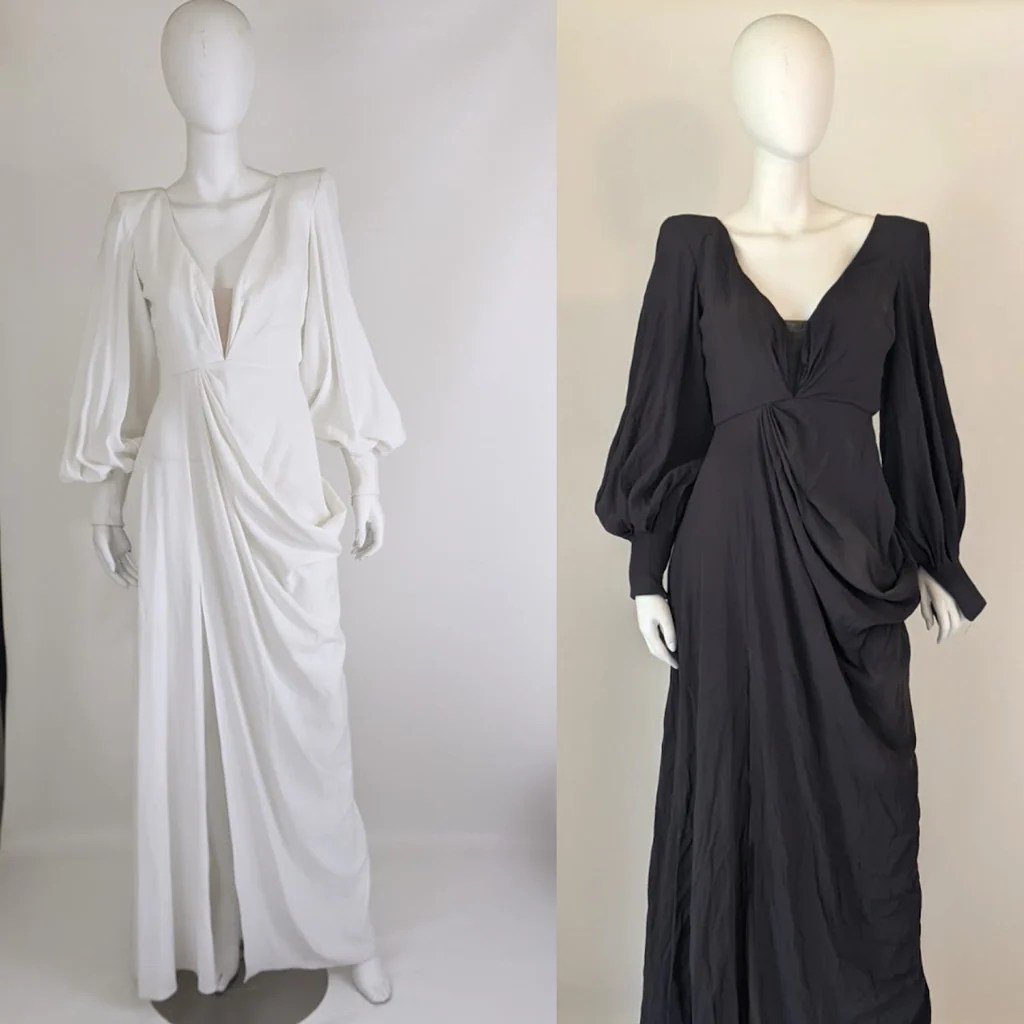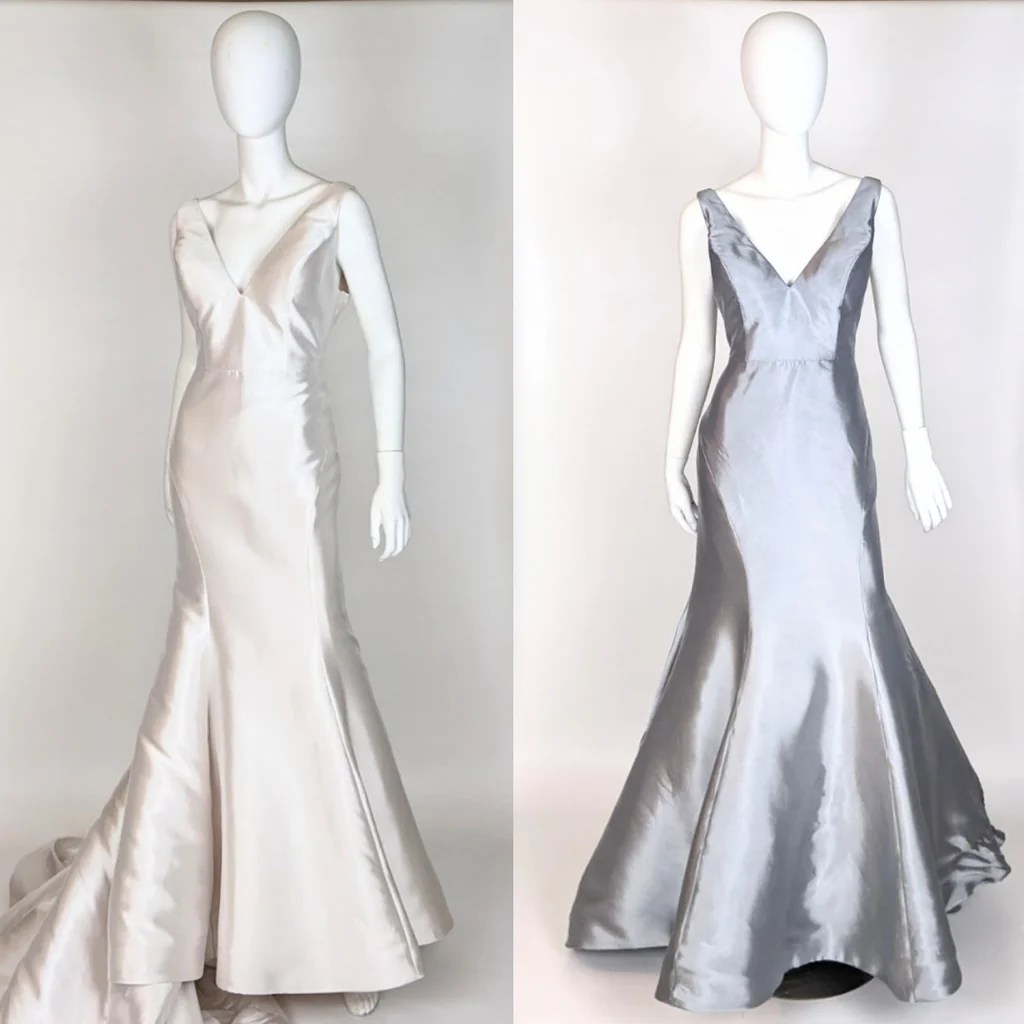The Allure of Black Wedding Dresses
Dyed wedding dress black – The traditional white wedding dress, symbolizing purity and innocence, has long been the cornerstone of Western wedding ceremonies. However, a captivating alternative has emerged, challenging conventions and embracing a darker, more dramatic aesthetic: the black wedding dress. This exploration delves into the rising trend of black wedding gowns, examining its history, symbolism, practical considerations, and the evolving societal perceptions surrounding this unconventional choice.
The Trend of Black Wedding Dresses: A Historical Perspective
While white didn’t become the dominant wedding dress color until Queen Victoria’s 1840 wedding, the history of non-traditional colors is rich and varied. Black, often associated with mourning in Western culture, has surprisingly made appearances throughout history, albeit rarely as the primary wedding color. The association of black with power, sophistication, and rebellion has gradually led to its increased adoption in modern weddings.
Examples of famous figures sporting black wedding attire are less common than those in white, but some interpretations of historical figures’ clothing suggest the use of darker shades. The symbolism of a black wedding dress differs significantly from the traditional white. White represents purity, innocence, and new beginnings; black, conversely, can symbolize mystery, sophistication, power, and a bold rejection of tradition.
This contrast reflects the evolving attitudes towards marriage and personal expression.
A timeline showcasing the growing acceptance of black wedding dresses might include:
- Early 20th Century: Sporadic appearances of black elements in wedding attire.
- Mid-20th Century: Black remains largely unconventional; seen primarily in gothic or alternative subcultures.
- Late 20th – Early 21st Century: A slow increase in visibility; designers begin incorporating black into wedding gowns.
- Present Day: Black wedding dresses gain mainstream acceptance, becoming a popular and stylish choice for brides.
Dyeing a White Wedding Dress Black: Methods and Considerations
Transforming a white wedding dress into a black masterpiece requires careful consideration of the dyeing method. Several approaches exist, each with its own advantages and drawbacks. Proper preparation is crucial to achieve a consistent, long-lasting result.
| Method | Pros | Cons | Cost |
|---|---|---|---|
| Professional Dyeing | Guaranteed results, minimal risk of damage, expertise in handling delicate fabrics | Most expensive option, requires outsourcing | High |
| DIY with Fiber Reactive Dye | Relatively inexpensive, can be done at home | Requires research and precision, potential for uneven dyeing or fabric damage | Low to Moderate |
| DIY with Fabric Dye (e.g., Rit Dye) | Readily available, simple application | May not produce a deep, true black, may fade over time | Low |
Preparing the dress involves cleaning it thoroughly to remove any dirt, stains, or sizing that might interfere with the dye’s absorption. Pre-treating the fabric with a dye fixative can enhance colorfastness.
Fabric and Dye Compatibility
The success of dyeing a wedding dress black hinges on understanding the interplay between fabric type and dye. Different fabrics respond differently to dyes, affecting the final color depth and evenness. Choosing the right dye is equally crucial.
Silk and satin, being delicate, require gentle handling and specialized dyes. Lace, with its intricate details, presents additional challenges. Fiber reactive dyes are generally preferred for natural fibers like cotton, silk, and linen, offering excellent colorfastness. Acid dyes are suitable for silk and wool. For delicate fabrics, a professional dyeing service is often the safest option.
A guide for dye selection might involve considering the fabric’s composition (e.g., 100% silk, silk blend, polyester blend) and choosing the appropriate dye type accordingly.
Styling a Black Wedding Dress

Source: renegadebridal.com
The versatility of a black wedding dress allows for a wide range of styling options. From classic A-line silhouettes to modern sheath dresses, the choice depends on personal preferences and body type. Accessories play a pivotal role in enhancing the overall aesthetic.
Dyeing a wedding dress black offers a dramatic, unconventional choice, a stark contrast to traditional bridal wear. However, the spectrum of bridal colors is vast; consider the vibrant alternative of a barbie pink wedding dress , for instance. Ultimately, the decision rests on personal preference, whether it’s the gothic elegance of black or the playful charm of pink, both offer unique expressions of individuality.
A black wedding dress can be accessorized with bold jewelry, statement veils, or colorful flowers to create a dramatic look. A minimalist approach, focusing on clean lines and simple embellishments, can create an elegant and sophisticated effect. A mood board might feature images showcasing various styling options, such as a black lace mermaid gown with a dramatic cathedral veil and ruby earrings, or a sleek crepe sheath dress with a delicate silver headpiece and minimalist jewelry.
The Social and Cultural Implications of Black Wedding Dresses, Dyed wedding dress black

Source: renegadebridal.com
Societal perceptions of black wedding dresses vary considerably. In some cultures, black is associated with mourning, while in others, it holds symbolic significance related to power, elegance, or mystery. Reactions differ across generations and social groups. Younger generations are generally more accepting of unconventional wedding attire, while older generations may hold more traditional views. The choice of a black wedding dress can be a powerful statement, reflecting the bride’s individual style, personality, and rejection of societal norms.
Essential FAQs: Dyed Wedding Dress Black
Can I dye a silk wedding dress black at home?
While possible, dyeing silk at home is risky due to its delicate nature. Professional dyeing is highly recommended to avoid damage.
How long does the black dye last?
The dye’s longevity depends on the dye type and fabric. Professional dyes generally offer better colorfastness than DIY options. Proper care extends its lifespan.
What if the dye doesn’t take evenly?
Uneven dyeing can result from improper preparation or dye application. Professional help may be needed for correction.
Can I reverse the dyeing process?
Generally, no. Once dyed, reversing the color is difficult and may cause irreversible damage to the fabric.
